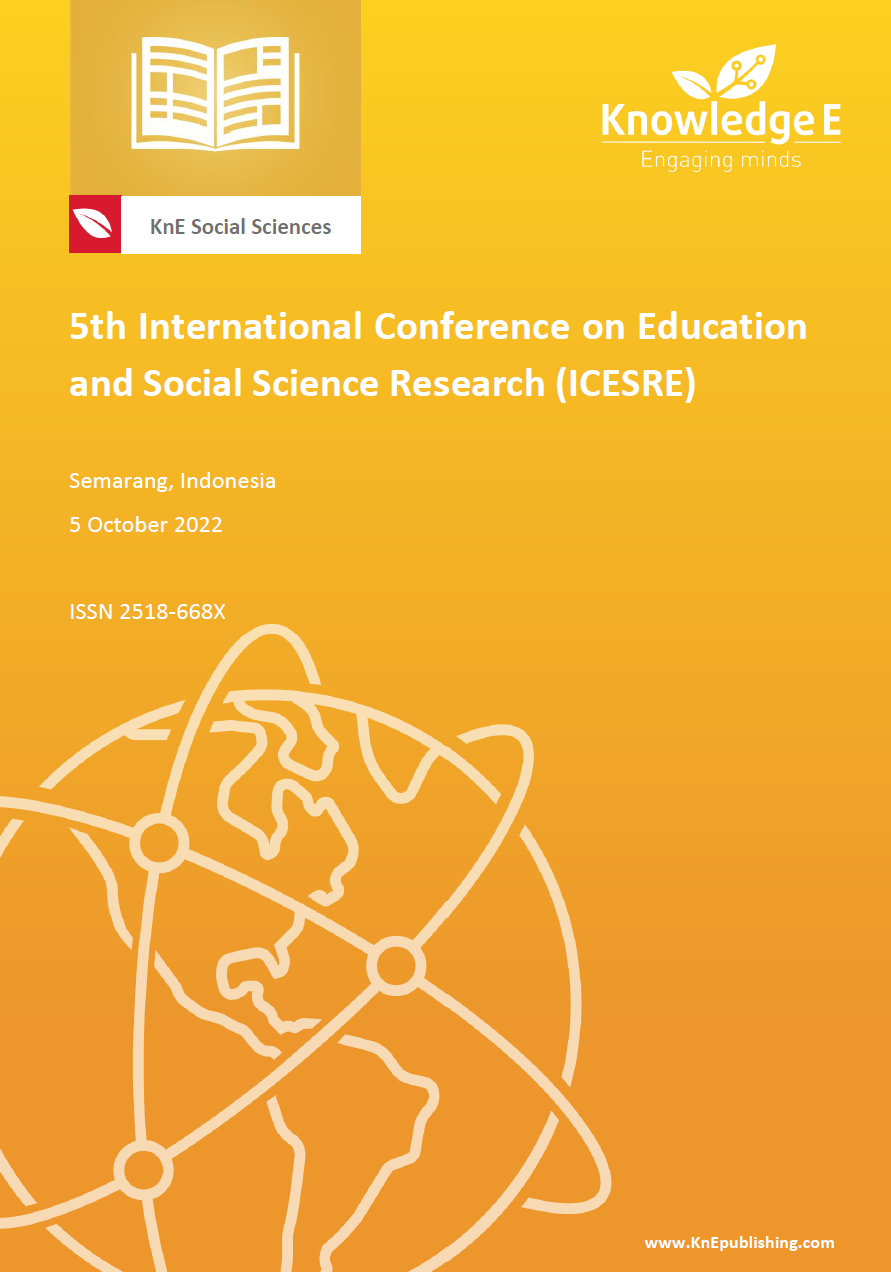Designing an Augmented Reality-Based Eduplay Learning Media to Improve Early Childhood Reading Skills
DOI:
https://doi.org/10.18502/kss.v7i19.12481Abstract
This study aimed to develop an eduplay learning media designed to improve early childhood reading skills. This research used the ADDIE method (Analysis, Design, Development, Implementation, Evaluation). However, this article only discusses the design stage. The subjects of this study were 5th semester students of the Early Childhood Education Study Program and were selected using the purposive sampling method. The results of this study are that augmented reality-based eduplay learning media have a feasibility percentage of 92.5% by media experts and 90% by material experts. Thus, eduplay learning media is appropriate for improving early childhood reading skills.
Keywords: eduplay, augmented reality, reading skills
References
[1] Wildová R, Kropáčková J. Early childhood pre-reading literacy development. Procedia Social and Behavioral Sciences. 2015;191:878–883.
[2] van Bergen E, van Zuijen T, Bishop D, de Jong PF. Why are home literacy environment and children’s reading skills associated? What parental skills reveal. Reading Research Quarterly. 2017;52:147–160.
[3] Benischek A, Long X, Rohr CS, Bray S, Dewey D, Lebel C. NeuroImage pre-reading language abilities and the brain’s functional reading network in young children. Neuroimage. 2020;217:116903.
[4] Goodwin AP, Petscher Y, Jones S, McFadden S, Reynolds TL D. The monster in the classroom: Assessing language to inform instruction. The Reading Teacher. 2020;73:603–616.
[5] Sari NE, Suryana D. Thematic pop-up book as a learning media for early childhood language development. JPUD - Jurnal Pendidik Usia Dini. 2019;13:43–57.
[6] Rais M, Aryani F, Ahmar AS, Arfandi H, Ahmad WKS. Learning media edu-games “my profession” as an effort to introduce various types of profession in early childhood education students. Journal of Physics: Conference Series. 2018;1028.
[7] Praherdhiono H, Pramono Adi E, Prihatmoko Y. Strengthening performance for teachers in early childhood education with heutagogy on the utilization of digital learning media and sources. 2018;244:74–79.
[8] Pratama LD, Setyaningrum W. Game-based learning: The effects on student cognitive and affective aspects. Journal of Physics: Conference Series. 2018;1097.
[9] Jääskä E, Lehtinen J, Kujala J, Kauppila O. Game-based learning and students’ motivation in project management education. Project Leadership and Society. 2022;3.
[10] Sunandar S, Rahmawati ND, Wibisono A, Buchori A. VAR based (virtual augmented reality) education game dissemination in geometry learning at unissula Semarang. SSRN Electron Journal. 2021:1–17.
[11] Binti E, Ridzwan M, Haniesya N, Farid B, Syarina F, Misni B. Eduplay dashboard application. Indonesia: I-JaMCSIIX; nd. p. 191–193.
[12] Rahmawati ND, Buchori A, Wibisono A. Effectiveness of VAR (virtual augmented reality)-based educational games in trigonometry learning in university. Proceedings of 2nd International Conference on Educational Technology (ICETECH 2021). 2022;630:266–269.
[13] Rahmawati ND, Buchori A, Hafidz M, Ghoffar A. The effectiveness of using virtual reality-based mathematics learning media with an ethnomathematical approach. 4th International Conference on Education and Social Science Research. 2022;2022:1005–1011.
[14] Utami IWP, Lutfi I, Jati SSP, Efendi MY. Effectivity of augmented reality as media for history learning. International Journal of Emerging Technologies in Learning. 2019;14:83–96.
[15] Madanipour P, Cohrssen C. Augmented reality as a form of digital technology in early childhood education. Australasian Journal of Early Childhood. 2020;45:5–13.
[2] van Bergen E, van Zuijen T, Bishop D, de Jong PF. Why are home literacy environment and children’s reading skills associated? What parental skills reveal. Reading Research Quarterly. 2017;52:147–160.
[3] Benischek A, Long X, Rohr CS, Bray S, Dewey D, Lebel C. NeuroImage pre-reading language abilities and the brain’s functional reading network in young children. Neuroimage. 2020;217:116903.
[4] Goodwin AP, Petscher Y, Jones S, McFadden S, Reynolds TL D. The monster in the classroom: Assessing language to inform instruction. The Reading Teacher. 2020;73:603–616.
[5] Sari NE, Suryana D. Thematic pop-up book as a learning media for early childhood language development. JPUD - Jurnal Pendidik Usia Dini. 2019;13:43–57.
[6] Rais M, Aryani F, Ahmar AS, Arfandi H, Ahmad WKS. Learning media edu-games “my profession” as an effort to introduce various types of profession in early childhood education students. Journal of Physics: Conference Series. 2018;1028.
[7] Praherdhiono H, Pramono Adi E, Prihatmoko Y. Strengthening performance for teachers in early childhood education with heutagogy on the utilization of digital learning media and sources. 2018;244:74–79.
[8] Pratama LD, Setyaningrum W. Game-based learning: The effects on student cognitive and affective aspects. Journal of Physics: Conference Series. 2018;1097.
[9] Jääskä E, Lehtinen J, Kujala J, Kauppila O. Game-based learning and students’ motivation in project management education. Project Leadership and Society. 2022;3.
[10] Sunandar S, Rahmawati ND, Wibisono A, Buchori A. VAR based (virtual augmented reality) education game dissemination in geometry learning at unissula Semarang. SSRN Electron Journal. 2021:1–17.
[11] Binti E, Ridzwan M, Haniesya N, Farid B, Syarina F, Misni B. Eduplay dashboard application. Indonesia: I-JaMCSIIX; nd. p. 191–193.
[12] Rahmawati ND, Buchori A, Wibisono A. Effectiveness of VAR (virtual augmented reality)-based educational games in trigonometry learning in university. Proceedings of 2nd International Conference on Educational Technology (ICETECH 2021). 2022;630:266–269.
[13] Rahmawati ND, Buchori A, Hafidz M, Ghoffar A. The effectiveness of using virtual reality-based mathematics learning media with an ethnomathematical approach. 4th International Conference on Education and Social Science Research. 2022;2022:1005–1011.
[14] Utami IWP, Lutfi I, Jati SSP, Efendi MY. Effectivity of augmented reality as media for history learning. International Journal of Emerging Technologies in Learning. 2019;14:83–96.
[15] Madanipour P, Cohrssen C. Augmented reality as a form of digital technology in early childhood education. Australasian Journal of Early Childhood. 2020;45:5–13.
Published
2022-12-21
How to Cite
Dini Rahmawati, N. ., Widodo, S. ., Khasanah, I. ., & ., W. (2022). Designing an Augmented Reality-Based Eduplay Learning Media to Improve Early Childhood Reading Skills. KnE Social Sciences, 7(19), 627–634. https://doi.org/10.18502/kss.v7i19.12481

